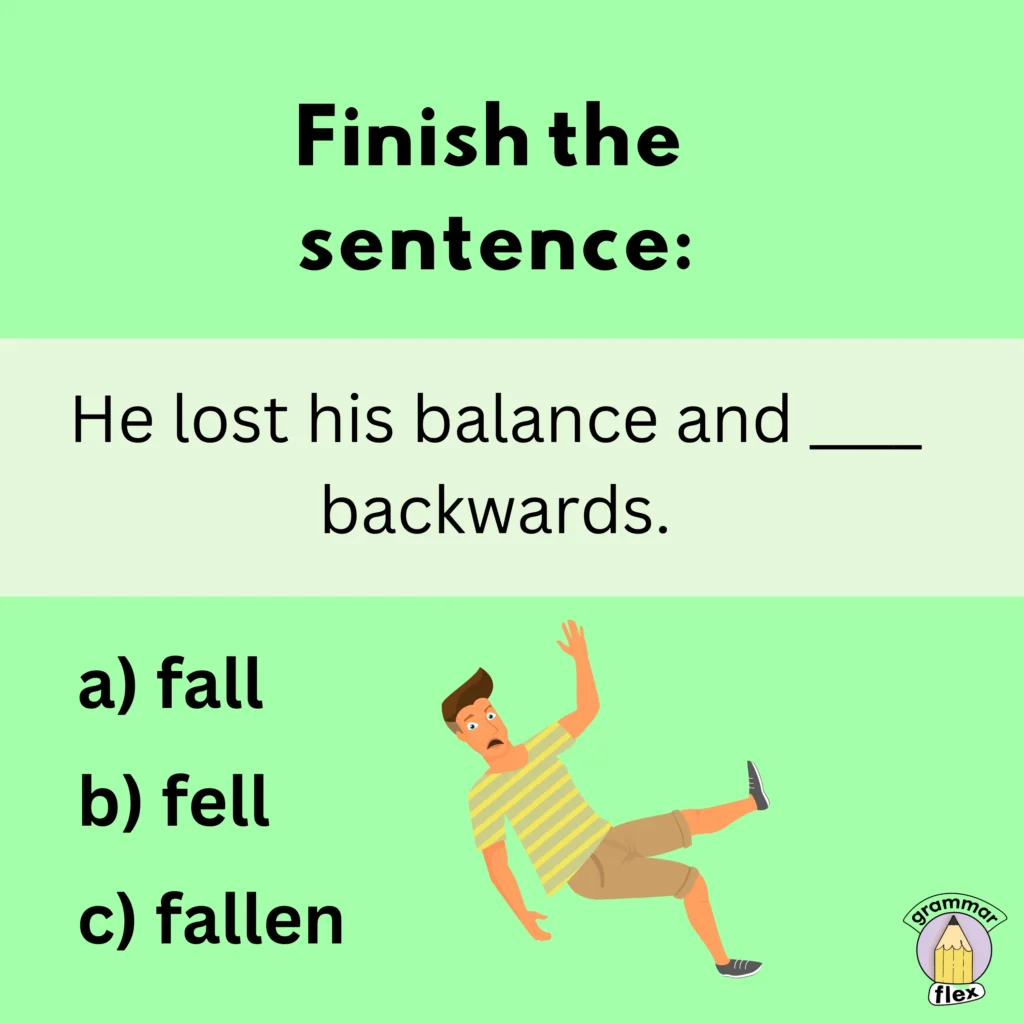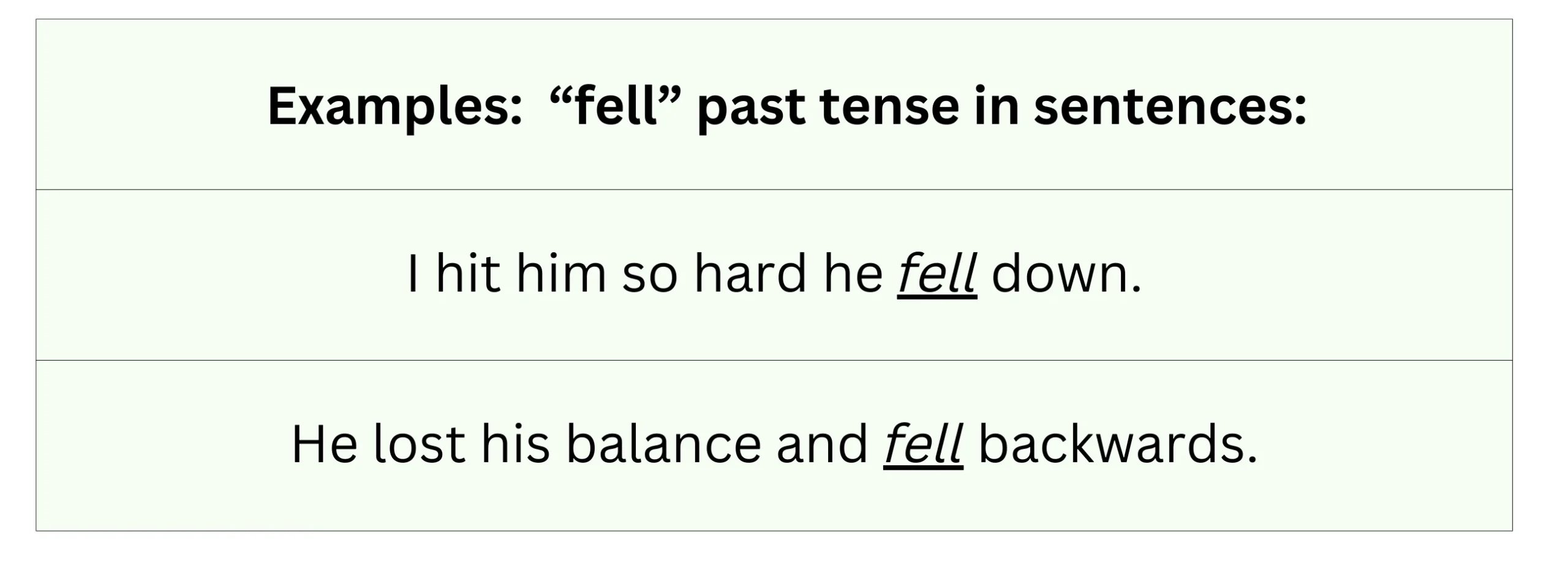
What’s the past tense of “fall”?
The verb fall (not the season fall or autumn) is when “someone or something moves quickly downwards onto or towards the ground, by accident or because of a natural force.”
- Fall is an irregular verb (does not use “ed” in its past tenses).
- Fell is the simple past tense form; fallen is the past participle form.

Verb tenses of fall
| present | past | future | |
| simple | I fall | I fell | I will fall |
| continuous | I am falling | I was falling | I will be falling |
| perfect | I have fallen | I had fallen | I will have fallen |
| perfect continuous | I have been falling | I had been falling | I will have been falling |
When to use fell vs. fallen
Both the past tense and the past perfect tense are verb tenses in English to describe actions or events that occurred in the past. However, they serve slightly different purposes and are used in different contexts. Compare the following:
He fell and hurt his leg. (simple past)
The handle had fallen off the drawer and onto the floor. (past perfect)
The first sentence in the past tense describes the action or event that happened in the past and is now completed. The second sentence uses the past perfect tense and shows that one past action or event happened before another past action or event. We use the past perfect tense to emphasize the sequence of events in the past.
“The apple fell from the tree.” (Simple past)
“I have fallen and I can’t get up.” (Past participle with “have”)
“The apple falled from the tree.” (Incorrect past tense)
“I have fall down.” (Incorrect past participle usage)
To form the past perfect tense, use the past participle form of the verb along with the auxiliary verb, had. For example, ‘She had fallen while walking down the road.’ The key difference between the simple past and the past perfect is the duration of the actions or events they describe: the past tense describes actions in the past without emphasizing the sequence of events. The past perfect highlights that one past action or event occurred before another, emphasizing their correct order.
“Fall”/ “fell” / “fallen”, used in sentences
| Examples: fall, used in sentence examples |
| Every time I visit the hills, I fall in love with nature.
The house looked like it was about to fall down. She took a nasty fall off a horse. Apples fall from a tree when there’s a storm. |
| Examples: fell/fallen, used in sentences |
| One of the kids fell into the river.
“The leaf fell on my shoulder”. A climber fell to his death. A fallen tree obstructed the road. I sat her on a fallen log by the side of the dirt track. |
Practice questions: verb forms of ‘fall’
| Select the correct verb form to complete the sentences. | Answers: |
|---|---|
| 1. How could anyone ___ asleep that fast? | a. falling b. fell c. falls d. fall |
| 2. He ___ flat on his face. | a. falling b. fell c. falls d. fall |
| 3. Rain ___ heavily from the sky during a thunderstorm. | a. falling b. fell c. falls d. fall |
| 4. The sound of rain ___ is calming for many people. | a. falling b. fell c. falls d. fall |
| 5. I guess I must ___ asleep. | a. fell b. have fallen c. had fallen d. fall |
| 6. The handle ___ off the drawer. | a. have fallen b. has fallen c. falling d. falls |
Answers
- d
- b
- c
- a
- b
- b
Synonyms of fall
- drop
- descend
- plummet
- tumble
- collapse
- crumble
- topple
- slip
- slide
- dip
- decline
- deteriorate
- sink
- sag
- decrease
Remember that “fall” is an irregular verb, so its past tense isn’t formed by adding “-ed”. Learn “fell” (simple past) and “fallen” (past participle) separately.
Origin of the word fall
From etymology online on fall (v.):
Old English feallan (class VII strong verb; past tense feoll, past participle feallen) “to drop from a height; fail, decay, die,” from Proto-Germanic *fallanan.
Learn more about verbs
- What are regular and irregular verbs?
- Transitive and intransitive verbs?
- What are verbs?
- Past tense of spread?
- What are personal pronouns?
- What’s the difference between they’re, their, and there?
- Whose vs who’s?
Work Sheet
According to the post, what is the simple past tense form of the verb “fall”?
Which form of “fall” is the past participle?
Which sentence uses an incorrect past tense form of “fall”?
Which sentence correctly uses the simple past tense of “fall”?
Which sentence correctly uses the past participle of “fall” with an auxiliary verb?
The apple from the tree yesterday.
He had already asleep before the movie ended.
She tripped and down the last few steps.
I haven’t off a horse in years.
The leaves had before the first snow.
Frequently Asked Questions
What is the simple past of fall?
+
Is “fall” a regular verb?
+
When do I use fell?
+
When do I use fallen?
+
What is the past perfect tense?
+
Yash, D. "What’s the Past Tense of Fall? Fell or Fallen?." Grammarflex, Jun 14, 2025, https://www.grammarflex.com/whats-the-past-tense-of-fall-fell-or-fallen/.
Sources
-
“Fall.” Merriam-Webster.com Dictionary, Merriam-Webster, https://www.merriam-webster.com/dictionary/fall. Accessed 11 Mar. 2023.











